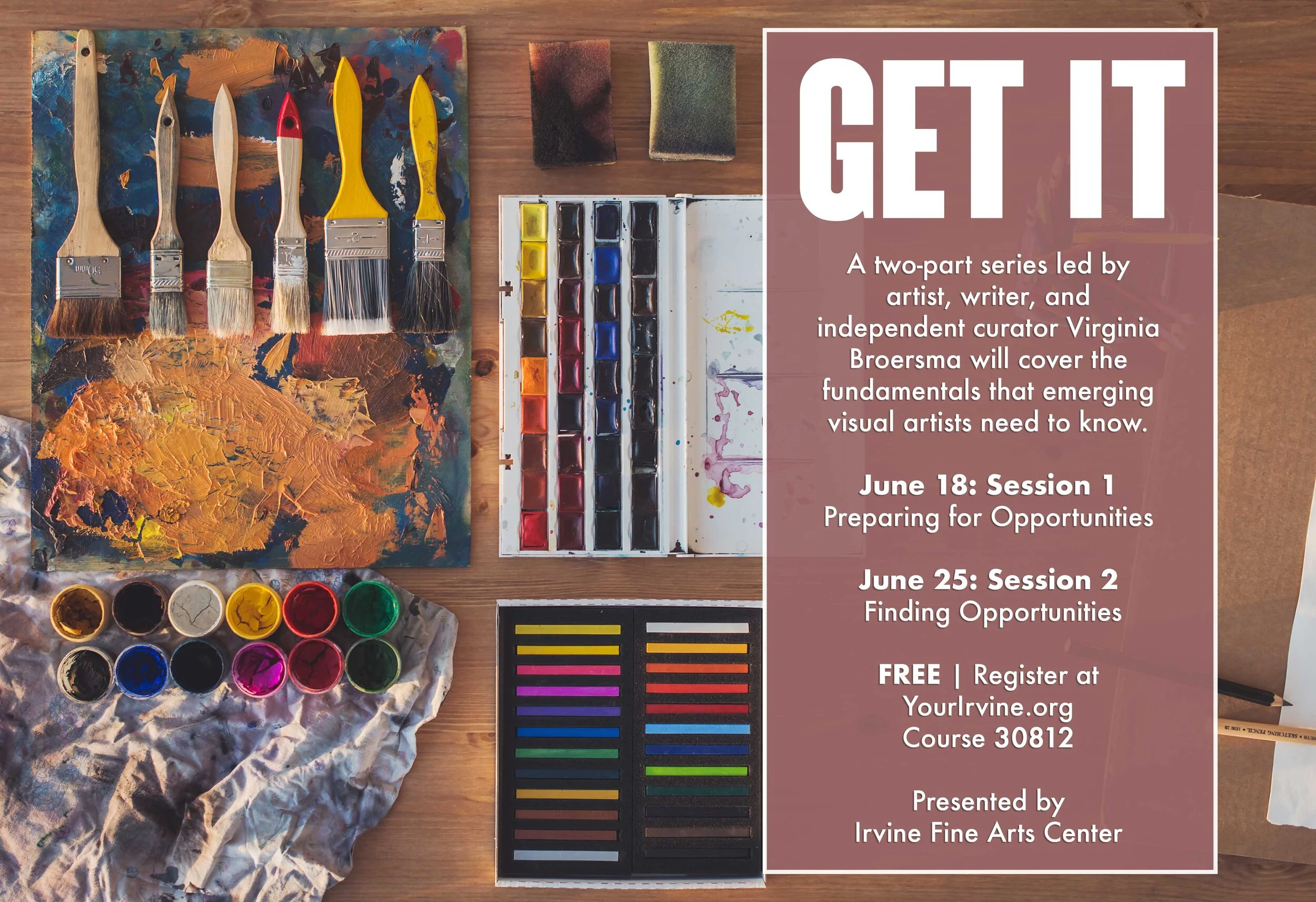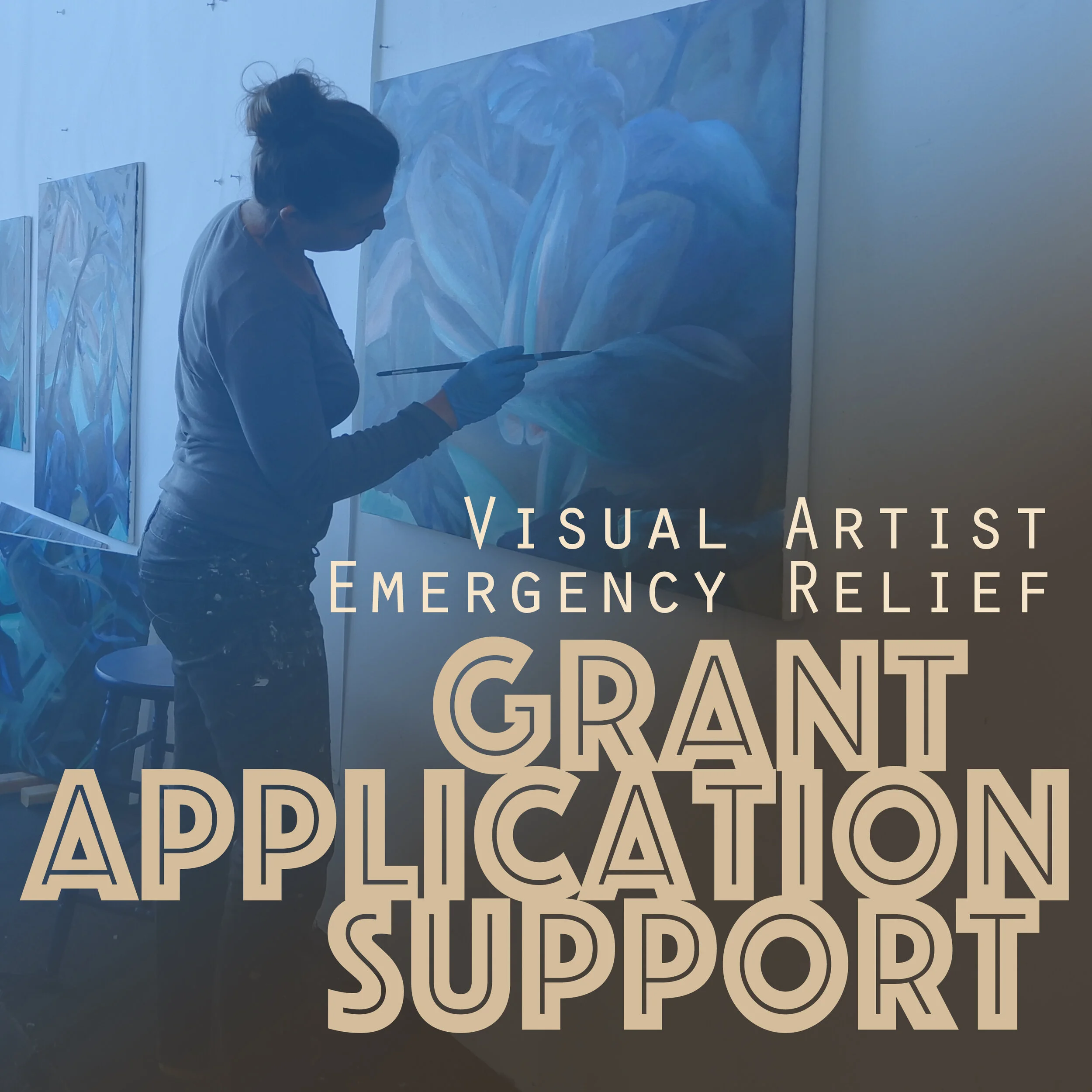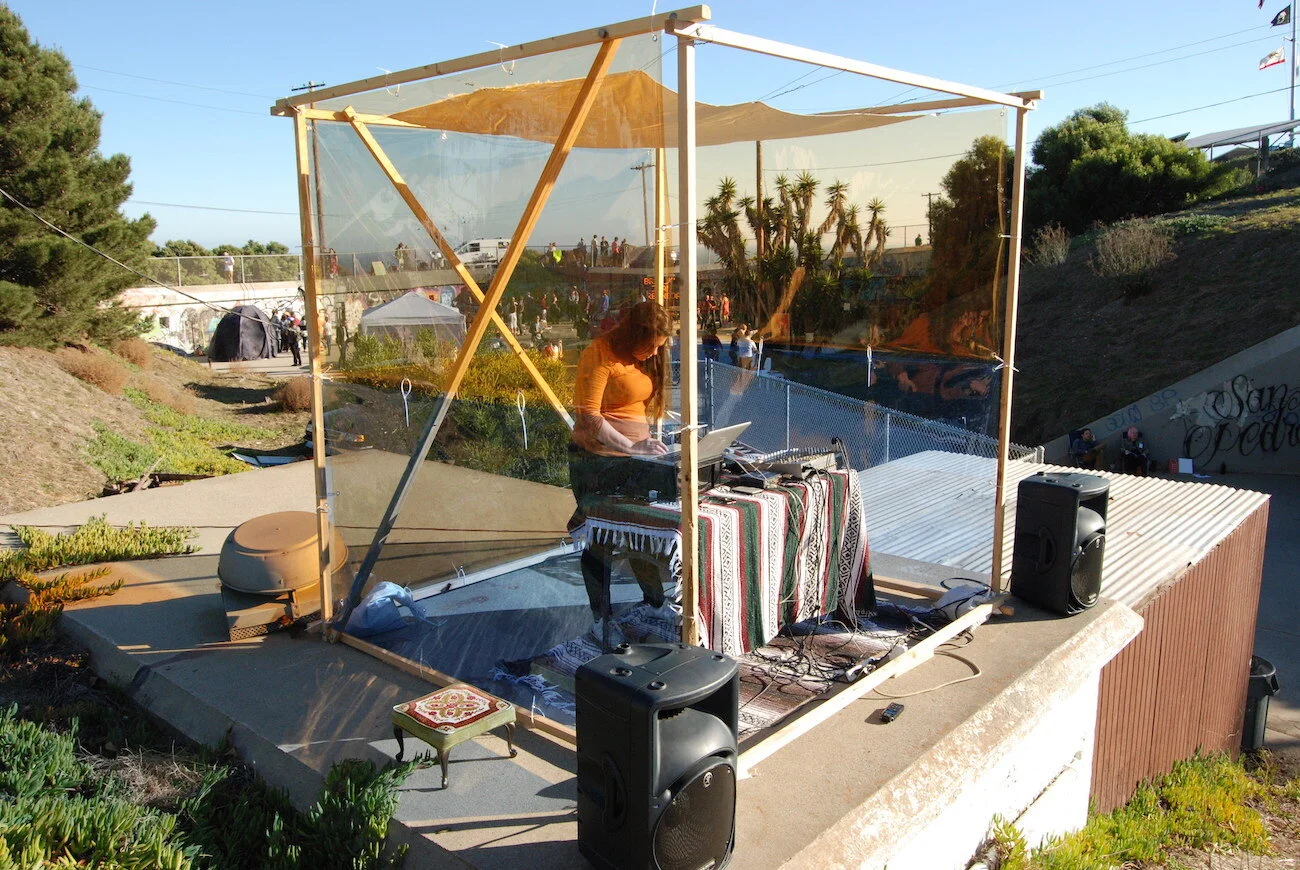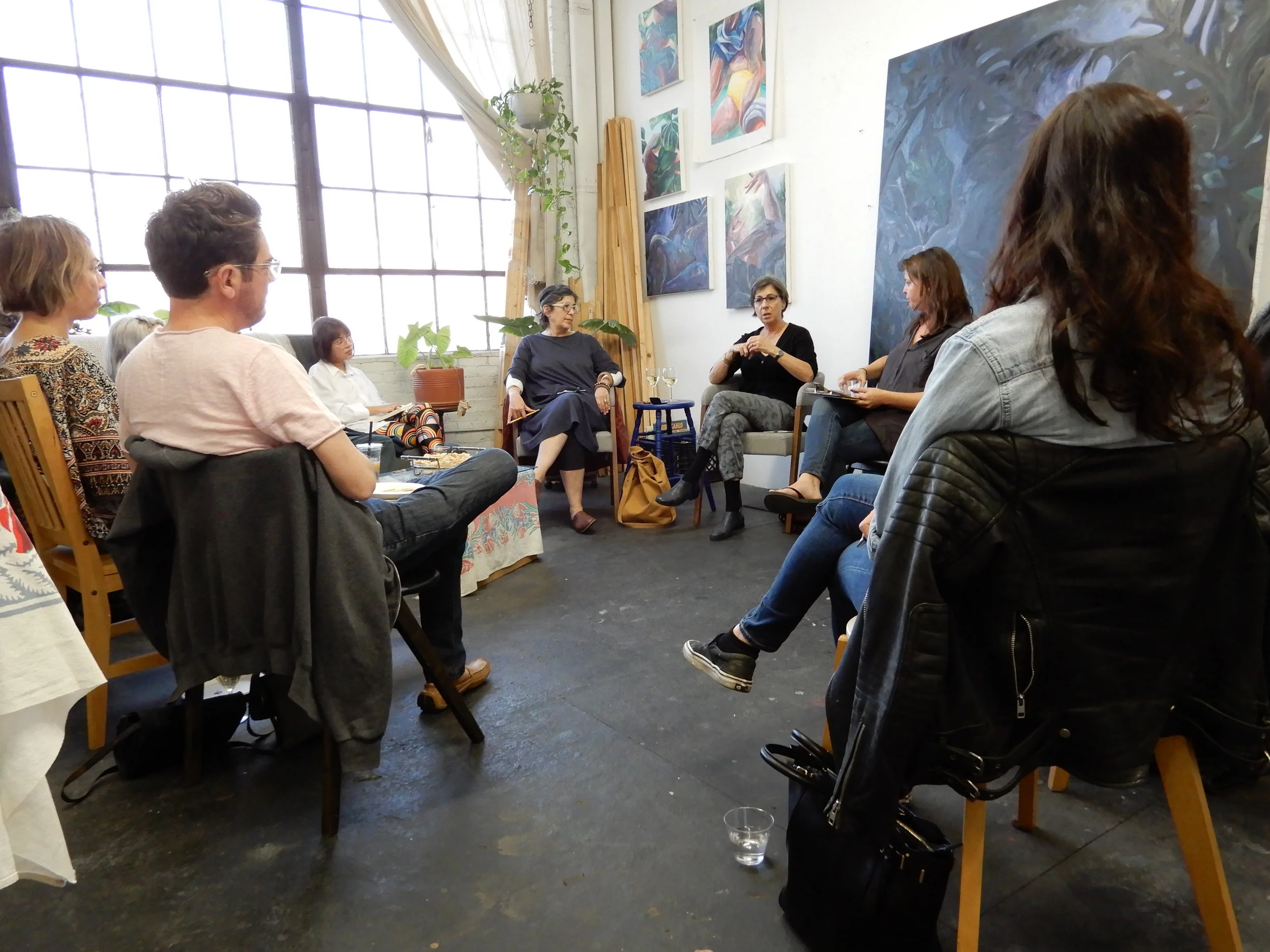This two-part series led by artist, writer, and independent curator Virginia Broersma, will cover the fundamentals that emerging visual artists need to know in order to present themselves professionally and competitively for career-expanding opportunities.
The Artist CV: Not just where you've been, but where you need to go
This workshop will first offer a nuts-and-bolts overview about building and maintaining a professional artist CV. But what I am most excited to offer is a way of thinking about your CV - as a tool or a roadmap - and as something that can help you plan actionable steps for progressing your art practice / career.
COVID-19 Emergency Relief Grant Application Support
During the COVID-19 crisis, I am offering sliding scale support for Visual Artist Emergency Relief Grant applications. This includes proofreading and editing statements, formatting and editing CVs, reviewing draft applications to confirm they follow all guidelines and help with other requirements, as-needed.
If you or someone you know need help with assembling and completing emergency grant applications, please reach out. I am offering this service at a sliding scale, please do not let lack of funds deter you from reaching out.
Collaborating With The Art World: Sacha Baumann's FULL BLEDE
So many artists I know struggle with knowing how to get involved, how to network and how to get visibility within the amorphous art world.
Getting your work noticed on Instagram amidst the never-ending stream of images, or setting yourself apart from the masses of other people at art events can be tiresome at best and you can feel like you’re having to fight your way into a world that should be welcoming you with open arms.
I always fall back on the idea that it’s better to try to shape the art world into the one you want to participate in as opposed to trying to squeeze into something that isn’t the right fit.
We are each other's Human Resources.
The art world feels like it has rules, and no rules at all. This can be very confusing.
We don’t have a human resources department to turn to when we have a complaint or want a raise. Instead, I have always felt that artists can be each other’s greatest resource for information, for connections, for emotional support and for critical feedback on our work. Finding trusted peers and mentors to do this can be really hard, and quite magical once you find them.
Why I want you to apply for grants.
Money doesn't grow on palm trees.
It seems like it wasn’t that long ago that articles like this and this were coming out about how Southern California is drawing artists from New York and elsewhere thanks to its booming art scene and affordable rents. Today, this seems laughable as rents have skyrocketed and gentrification spreads to every last nook of Greater LA’s sprawl.
Making Space for Other Places
Every year, I receive a press pass to Art Los Angeles Contemporary—a local art fair known as ALAC—and because I can never pass up a free ticket, I attend the opening. I am always curious to see what the scene is like in this hyped up, pop-up showroom which brings a wide swath of the art world together, who are as much on display as the art. It is great for people watching.
Fairs can be great opportunities for rubbing elbows, but it can be difficult to escape the pervasiveness of positioning and transactional relationships. Selling is the number one priority and definitely impacts how people interact.
I recently had a conversation with an artist who expressed a similar sentiment regarding art fairs.
“Art fairs are the worst,” Keith Rocka Knittel told me, half jokingly.
Home Grown Galleries
I recently visited Iowa and the souvenirs in the airport gift shop reminded me that Iowa is where “Field of Dreams” takes place. As a child of the ’80s, this movie was part of my upbringing; I regularly quoted the line “If you build it, he will come” and it’s the first thing that came to mind after speaking with Long Beach artist Jacob Melchi.
Survival of the Artist: Accepting Rejection
I have amassed quite a folder of rejection letters. I’m actually quite proud of it. It’s a record of my efforts to get my work seen, funded and promoted. There are ideas that have been proposed, denied, rethought, submitted again and, every once in a while, accepted. I’ve actually made a habit of celebrating when the “I’m sorry, but…” email arrives in my inbox. I make myself a cocktail when I get home and toast myself for trying.
When you start putting your work out there and applying for things regularly, you also should expect to start getting rejected regularly.
Survival of the Artist: Knocking at Opportunity
Recently, I was in the checkout line at Trader Joe’s, earbuds in place and eyes locked on my phone to deter the cashier’s questions about what I would be making for dinner that night. He asked what I was listening to. It was a podcast, and when I told him it was an artist podcast, he asked if I was an artist. I said yes, and then he asked the question that almost always inevitably follows, and the question that I loathe:
“Oh, so you support yourself by selling your work?
Rhizomatic Arts Project Spotlight: Virginia Broersma + The Artist's Office
This month we are spotlighting another "sister-project” to Rhizomatic Arts — a great example of a creative, artist-centered, sustainability-oriented entrepreneurial project by an artist who seeks to grow sustainability and peer support in her community. VIRGINIA BROERSMA is a fine artist who recently started a business called THE ARTIST’S OFFICE, putting her administrative and organizational skills to work for others. She says, “I want to contribute to shaping the art world/community/market that I want to participate in. This world would offer opportunities to a wider swath of people, would support art and art makers as essential pieces of our society, and would make artists feel valued and less desperate.”
Meet Virginia Broersma of The Artist's Office: Interview with Voyage LA
The Artist’s Office is starting small but with a big vision. The ultimate goal is to help artists become self-determining of their own trajectory rather than waiting for some outside force to select them for success. That model has privileged a few, and I want to help spread opportunity and success around to a wider group of people.
I’ve started by developing a few pragmatic ways I can help with this.
Chatting with Gatekeepers
In March 2019, The Artist’s Office launched a series of conversations for artists with arts professionals, gatekeepers and thought leaders. These conversations are small gatherings that are opportunities for artists to gain insight and knowledge to help strategize and make choices for their art practice.
The first talk was on the jurying process for artist opportunities such as grants, fellowships, juried shows and residencies with Dorit Cypis - artist, mediator and social activator and Irene Tsatsos - Gallery Director/Chief Curator at the Armory Center for the Arts.
Do you need the Artist's Office?
As much as I love my time in the studio, administrative work is actually appealing to me, and I’m good at it. I try to encourage my friends to update their websites, write their artist statements, and apply for grants. Most of the time, these suggestions are met with a look of dread, and then lots of excuses.















